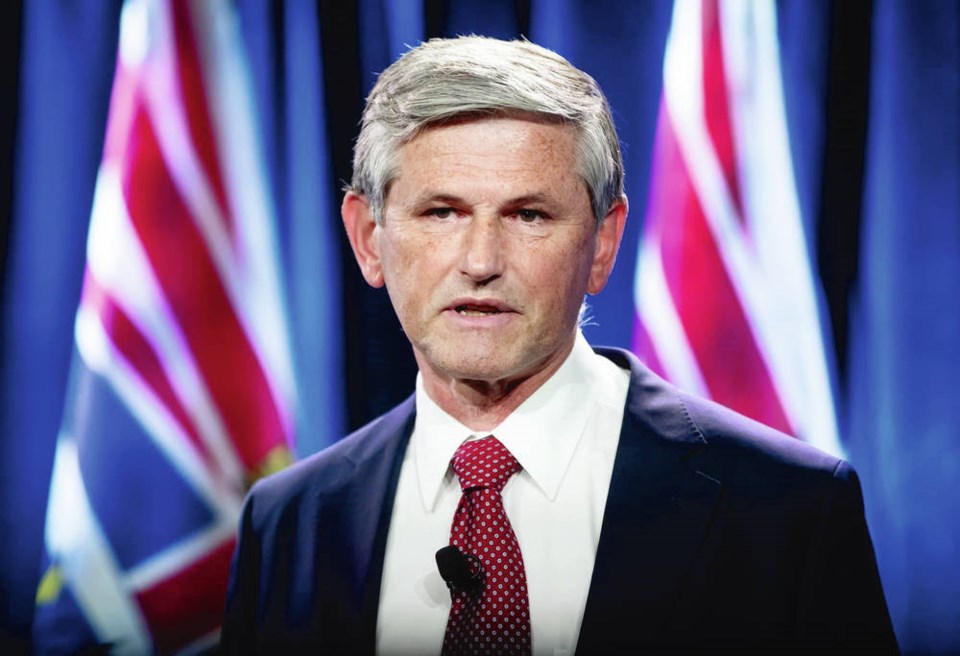B.C. Liberals used the gambit 19 years ago and although it sparked an argument, they felt it worked.
The NDP used a modified, targeted version just three years ago, and are convinced it worked as well. So now one of the standard moves from every election playbook – a promise of a big, exciting tax cut – has been added to the B.C. Liberal promise list.
Party leader Andrew Wilkinson promised Monday to cut the seven per cent provincial sales tax to zero in the first year of a Liberal government, and hold it to just three per cent in the second year, as a means of jolting the economy out of the COVID-19 slump.
“This will give people spring in their step,” he said. “This is designed to get everybody livened up and out there enjoying life again.”
It goes much further than what business leaders have been suggesting. The B.C. Business Council advocated a 50 per cent PST cut as a pandemic response.
A long holiday from a tax that people pay multiple times a day every day of their lives shows the same flair for the dramatic that Gordon Campbell displayed as premier in 2001, when he slashed personal income tax by 25 per cent on his first day in office. (Wilkinson was his deputy minister then.)
It also echoes a more recent move, the NDP’s sudden decision in 2017 to eliminate tolls on the Fraser River bridges, something that netted them a handful of new seats in commuter-dominated ridings south of the river.
The big downside is the giant hole such a move would blow in government revenues. But B.C.’s annual operating budget has been so ravaged by the pandemic, along with everyone else’s, the damage to the books would be less apparent.
Eliminating the sales tax would cost the treasury about $7 billion in one year. Cutting it to three per cent would cost about $4 billion.
B.C. has gone from balanced books to a $14 billion deficit in just seven months. Piling up billions more in debt as a stimulus measure is the equivalent of setting a controlled burn on an out-of-control wildfire.
Wilkinson was dismissive of the costing implications. He did say there would be no cuts in health or education to make up for any shortfall.
“We will not be cutting any of those services because at a time like this that’s exactly when they are needed.”
“We’re in a big economic crisis and this is not a time to worry about the details too much as to get people back to work.” He estimated it would save a family of four $1,700 over the year.
But a former B.C. Liberal cabinet minister who had to cope in government with the devastating effect of that 25 per cent tax cut has strong reservations about redoing it. George Abbott handled multiple portfolios and wrote a PhD thesis and then a book (Big Promises, Small Government) about the aftershocks.
As he put it in those pages: “The dream of doing more with less was transformed into the harsh reality of doing less with less.”
Reacting to Wilkinson’s announcement, he said: “It’s not a policy I would recommend to him.”
The sales tax cut would cost about five times as much as that long-ago income tax. It’s of general benefit across-the-board to all taxpayers, when what’s needed is targeted help to people who most need it, he said. “If we’re prepared to go even deeper in debt, what would we want in benefits? I’d be inclined to put that money into projects directly beneficial to the people who are most vulnerable and disadvantaged.”
Abbott said people who are unemployed and are facing homelessness would not get a direct benefit. The cut would mean billions of dollars are not available for direct programs.
Wilkinson’s move is designed to restore consumer confidence, but Abbott said the fiscal crisis is not due to lack of spending or unemployment. It’s the wholesale disruption of the economy created by COVID-19.
“If the problem is not related to consumer spending, why dig the hole that much deeper to try to address consumer spending?”
The unprecedented economic damage today makes it hard to compare a sales tax holiday on fiscal terms. But on the political side, Liberals see it as a winner. And that’s the side that counts, for the moment.



